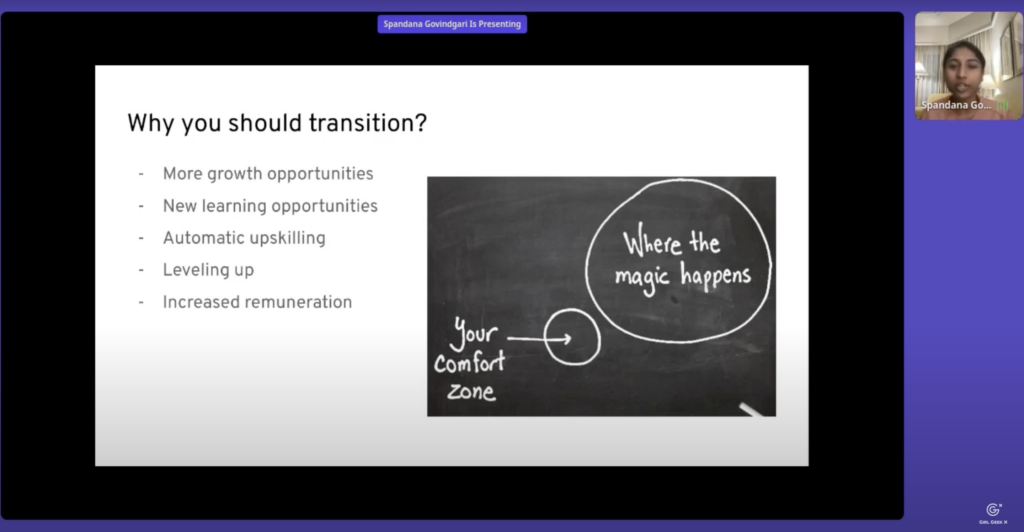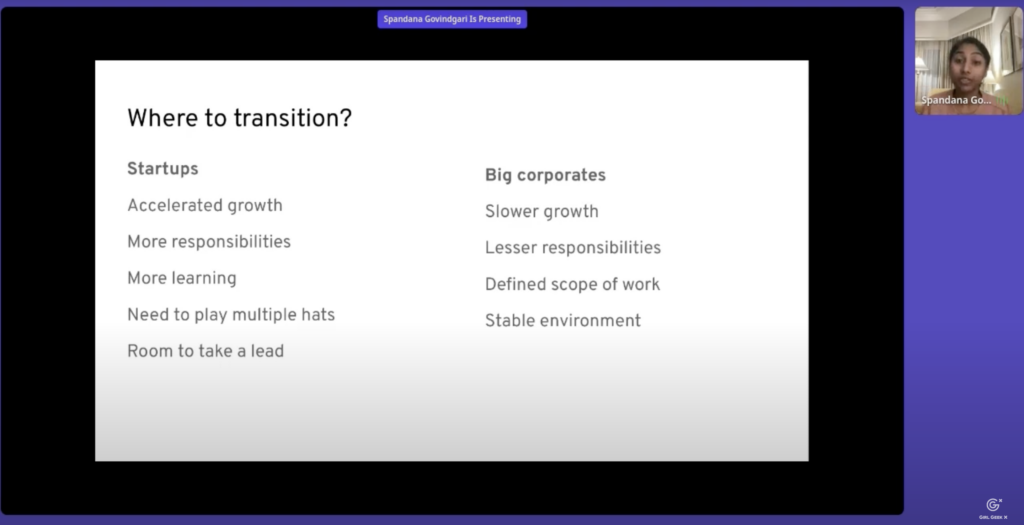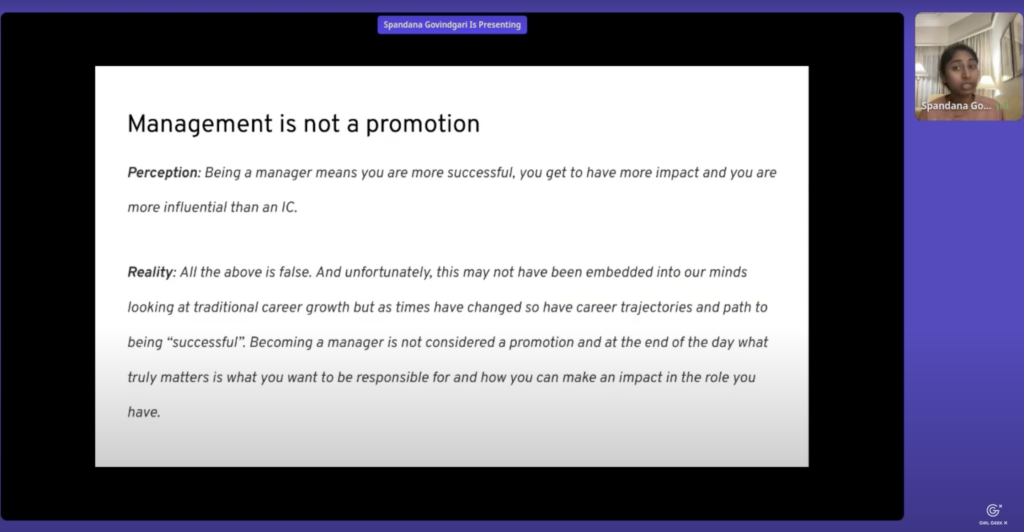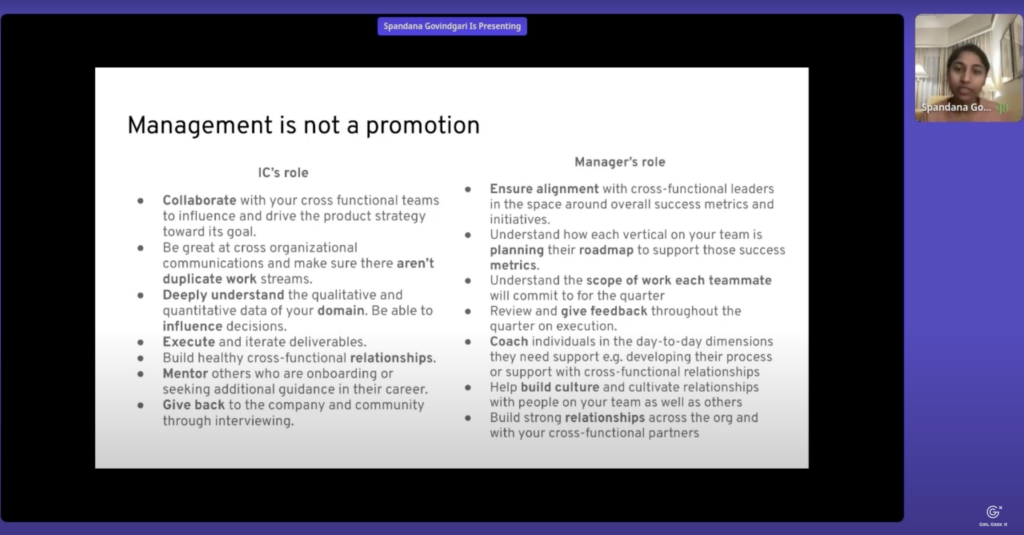VIDEO
Spandana Govindgari (Staff Engineering Lead at Meta) talks about how to transition from corporate to startups, what skills are required to be successful, the pros and cons of working at a startup vs corporate, and growing as an individual contributor (IC) without transitioning to management.
Like what you see here? Our mission-aligned Girl Geek X partners are hiring!
- Check out open jobs at our trusted partner companies.
- Watch all ELEVATE 2023 conference video replays!
- Does your company want to sponsor a Girl Geek Dinner? Talk to us!
Angie Chang: We have with us today Spandana Govindgari who is a staff payments engineering lead at Meta in New York. She has helped build and scale payment experiences to support social commerce across Instagram, WhatsApp, and Facebook shops and marketplace, helping process billions of dollars at TPV, which I looked up, means total payment volume. Before, she worked at Apple and Snapchat. And think she’s gonna talk about that during her talk, so I should hand it over and say, welcome Spandana!
Spandana Govindgari: Thank you Angie. Thank you for the wonderful introduction and also for having me. This is an awesome opportunity. Welcome everyone to Elevate! Hope all of you are connecting with each other. Just getting a lot of talks in great learnings. I’m here to talk about specifically stepping out of your comfort zone. I’ll be talking about why, when, where to transition to when you are feeling stuck, what comfort zone really means, and how to leave it, and how all of this can truly help you grow your career. But before we start just a little bit more about me.
Spandana Govindgari: My name is Spandana. I am currently a tech lead at Facebook working on payments. I graduated from Cornell in 2015 and ever since tried to really diversify my work experiences. I’ve been in the industry for now six to seven years, but have worked in my own startup. I worked at a pre-IPO company called Snap, which was really small back then, and also at really large companies like Apple and now Meta. So most of this talk will be oriented towards career growth for a software engineer. And I’d like to like just get a sense of like who’s in the room. How many of you here have just started working with less than one year of working experience? Awesome. And how many of you have been a software engineer for over a year? Feel free to like, use emojis or however you want to or comment here on the feed as a lot more people here have worked, looks like over here. And we also have some you know, new folks here.
Spandana Govindgari: This talk will be useful normally for like people entering the software engineering industry right now, but also for folks who have been over a year and are at a point where they’re feeling like they’re in a comfort zone and like, don’t quite, okay, what do I do next? Or how to leave it. And if there are like three takeaways I would want you guys to take from the talk, here they are.
Spandana Govindgari: It’s important to transition from corporate to startups specifically for growth as the main factor. Every day you have to continue to develop your skills as a software engineer. If you’ve been in this field, you know, every single day things are changing, new things are coming up – upskilling – it sort of becomes your core – learning new languages, so frameworks, libraries, and becoming familiar with them.
Spandana Govindgari: And the third important point is, it’s not required to really transition to management to grow. And of course, like I’ll go through each one of them and how I really arrived at all of this advice or insights from my own, like personal work experience. If you look at like, my own career journey, I’ve transitioned almost every two years. The longest I’ve worked at actually one single company is right now at Meta and reaching my fourth year. And I did this transition very early on in my career when I was feeling like I am entering comfort zone or I am in this comfort zone. I think like when you guys go back to like, when you’re starting your career, most of us are really just desperate to get a job offer.
Spandana Govindgari: Some of you may have chosen to work at a startup, or some of you may have wanted to work at a big company, and that’s that’s one of the like hardest crossroads you’ll find yourself where you have to make a decision. I was in a similar crossroads when I started. I had two offers, one from Uber and one from Apple. At that time, Uber was a really small startup, and Apple was a giant and still is today. Both of them are really good companies. I had good team, lots of learning and at the very beginning of my career – how do you choose which company to start off or kickstart your career with?
Spandana Govindgari: I’d say like, the most important thing I focused on was really like mentorship and where I could find a solid mentor who would have the time to help me grow. And I got exactly that at Apple. This laid a strong foundation for me to leave my comfort zone. Later on in my career journey, I thought I’m just, you know, going to continue to work, work up the ladder in one company.
Spandana Govindgari: But as I was hitting my one year mark, I started realizing I’m already feeling kind of stagnant. I was feeling like, you know, I’m not learning anything new or I’m growing. Basically I felt like my learning curve has reached to peak and everyone’s learning curve is different. I’ve listed here some signs that you should really watch out for when you should transition.
Spandana Govindgari: And I’ve spoken to a lot of other software engineers as well, fellow female engineers about some of these signs where they felt like either stuck or kind of fi trying to find new opportunities for transitioning. And some of the signs are really like, you know, not learning anything new, important sign, getting stagnant, having conflicts in your team that are beyond resolution.
Spandana Govindgari: Not getting rewarded, not getting enough visibility, which is a very big one for women overall. You’re feeling dissatisfied, going to work. When you see all these signs, that’s a great way to know that it is time to transition and why should you transition, right? If you look at the bubble here, the bubble is where your comfort zone lies. But outside is where the magic happens. In your comfort zone, you feel safe, you feel like you’re in control, you know all your teammates, you know your, the company, you know how it works. You have a cushion, right?

Spandana Govindgari: But you are still finding yourself walking into it every day feeling dissatisfied, disinterested. That is why you leave your comfort zone in order for you to grow and really achieve that fulfillment and satisfaction. And in order to leave your comfort zone, really like three things should happen. First of all, you need to conquer your fears. You should be open to learning and thereby you are going to grow. And that’s the reason you should transition. You know, as soon as you are feeling like you are in your comfort zone, but you know, how do you get out of it really? There are fears on the other side, uncertainties. There’s just new challenges that you may not be familiar with, right?
Spandana Govindgari: In order to really get out of your comfort zone, start with your own workspace and try and find opportunities that are kind of out of your own role or out of your own team first. Take the baby steps and then take the big steps. If you’re not able to really find opportunities within your own team or within your own company, then look for opportunities outside.
Spandana Govindgari: You should consistently be on the lookout for these opportunities because they will not just walk to you if you are not specifically looking for them. And how do these opportunities really look like? They come in the form of helping your recruiting team hire or interview candidates. They come in the form of mentoring other women engineers. These are all that go above and beyond your role, but in some way, extending your comfort zone so you can con your fears, find mentors, right? Remove those excuses that is stopping you from leaving your comfort zone.
Spandana Govindgari: And then you will find this crossroads. Really, you have two choices in the tech industry in order to grow. First of all, you know, if you’re at a big company, work at a startup. If you’re in a startup, work at a big company.

Spandana Govindgari: It’s important to diversify these experiences earlier on in your career because once you’ve worked at, I guess, like both sides you’ll really understand the industry as a whole, how it works, and kind of be ready to take on anything that comes your way.
Spandana Govindgari: Startups offer various different things than corporates. Obviously. They offer accelerated growth. You get to take on a lead role you know, more responsibilities, more I guess like roles you can play within a startup and more learning. Big corporates, they come with their own advantage, right? Like, there is slow and growth, maybe lesser responsibilities. Your work is defined, but it’s a stable environment for you to really grow, experiment, conquer those fears slowly.
Spandana Govindgari: And no one’s really like pushing you to sort of fill this gap. They offer really two different kind of experiences. And it is important that you have experience of both. You can in the future delve into something deeper. And however, regardless where you work in a startup or big corporate, every software engineer comes across another crossroad.
Spandana Govindgari: This is a crossroad. You have to choose between going to management and continuing down the IC ladder. And this path is something that is laid out and is standardized across the industry, and many think management is easy, I’m gonna get wider visibility. However, it’s not always straightforward within management as well. There are some skills that are super different if you’re becoming a manager versus like an IC.

Spandana Govindgari: And today I’ll talk more about what it means to really continue down the IC path because it is a road less traveled. And something I have traveled as as well when I was at, at these crossroads and decided to choose the IC path. Most people think I’m just gonna go pick management. It’s sort of a promotion. Right? But that is the perception. Reality is, it is not, doesn’t matter, you’re a manager, an IC.
Spandana Govindgari: It’s the impact that you’re making that really versus like all the reward, the visibility that you get within a company. If you look here, I’ve listed basically some of some of the essential roles and responsibilities as you are climbing up the ladder. Let’s say you’re at that principal IC level, or that director or manager, senior manager level, the kind of words or that stand out in the IC role is collaboration, avoiding duplicate work, understanding the domain, executing, mentoring, building relationships, and giving back in a manager’s role. Or as you are climbing of the management ladder. Or really the standout words are coaching, building culture, planning, roadmap, determining what each teammate does.

Spandana Govindgari: Giving feedback now, you can see is like stark difference between what you wanna do versus like the reality in terms of what actually an IC does as they climb up the ladder versus like a manager. Based on this, you can decide through the, through that important crossroad of yours, whether you wanna continue down the IC path or the management path.
Spandana Govindgari: In industry, it is fairly common to switch between both. You’re an IC go to, you are like, I wanna try management, go ahead, do it. If you’re a manager, you are no longer interested in doing management, you can switch back and continue doing IC work. And none of that means like you’re promoting, you’re getting promoted or you’re getting demoted. Both of them are separate tracks and both of them you know, do work that definitely impact the org.
Spandana Govindgari: That is why we have wonderful, great ICs still in a company and not everyone’s a manager. And we also have managers and directors helping kind of grow the org. But they are just focused on very, very different things. I decided to actually choose the IC route and not go through management yet in my career because, I wanted to deeply focus and execute within my domain and develop a deep understanding of payments over. And, you know, like you may be seeing mostly in your own company, and it’s very common to like see you know, maybe like your role model or some I see just transition to management and that those sort of examples I guess are very common within the industry overall.
Spandana Govindgari: Where do you, I guess, like to look for when at least I was, I was starting out as like, who are those strong IC women engineers? I can look for who are these role models? And surprisingly, like, you know, Marissa Mayer – she was the first female engineer at Google. She was an IC, her IC work you know, eventually contributed great deal to Google led her to the path. She did eventually, you know, she became the CEO, which is like a management path, but it is important to shine light on the fact that she was, she started out as an IC, Ruchi. Ruchi Sanghvi is the first female engineer at Facebook, eventually went down this VC route, which entirely different. But she was an IC as well. Both of them built great products. They were significant in the company’s growth.
Spandana Govindgari: The work that ICs do is really, really important. You can choose to take the re road less traveled, or the one that is often, but it is important to leave your comfort zone in order for you to really see what’s on the other end where the magic really happens. With that, thank you everyone. I hope you’ve learned something from this session specifically about identifying science for when you are in your comfort zone, and then how to leave it confidently in order for you to really grow your career. Thank you.
Spandana Govindgari: I’m happy to take some questions because I know we ended a little early, I will also post my LinkedIn if you guys want to connect with me post session. Always looking to connect with more women. Oh, Angie. Hi, you’re back. No, do you wanna answer questions? Yeah, sure, so I see the first question.
Spandana Govindgari: How can you recognize when you’re out of your comfort zone versus truly out of your depth for your current level? This is a great question. When you’re out of your depth for your current level that may not mean you, you’re out of your comfort zone. And what that means is there’s just more room for learning versus com comfort zone really means, you know, that learning has peaked.
Spandana Govindgari: I feel like you can always address the depth and you can almost go deeper, but there is some point where you may want to explore that depth at a different company with different challenges. I started at Snap within payments and then I decided I’m going to explore payments more deeply at Facebook. Snap was small company. I wanted to work on payments at scale which is a different problem. You really can go deep at a company like Facebook that’s handling billions of, you know TPV.
Spandana Govindgari: Transitioning and leaving your comfort zone ultimately also improves the depth at your current level. I hope that answers your question. Any other questions?
Angie Chang: Is there another question or is that,
Spandana Govindgari: Yeah, there is one more. I hear so much about coaching, giving feedback, and building culture for managers. However, I’ve seen only one manager do that so far. What does the ground reality of what managers do? The, that is terrible <laugh> The ground reality is that managers are supposed to be coaching, giving feedback, and building culture every single day exclusively if they are, if you, you are seeing only one manager do that so far in your career or I guess your company is important to also like, have a conversation with your HR about what manager role means at your company and what the roles and responsibilities look like and how you could become right a, a manager yourself. If the responsibilities are different, it’s important to like, take the slide as an example and ask your HR team to really lay out, you know what, I’m an IC, please, you know, these are my responsibilities, this is the level I’m at. How is it different from what a manager is doing? Can I please, you know, get a rundown? And having that clear distinction helps you really understand the, the differences in roles and responsibilities. I would advise you to definitely be in touch – feel free to talk to your HR team on your career growth team that’s laying out what these roles and responsibilities look like.
Angie Chang: Great. Is that the last question? Okay. Thank you so much Spandana for joining us today on International Women’s Day. I think we’re gonna be jumping into a final speed networking round. A little bit of housekeeping before we go to do that. All of these talks are recorded in Airmeet right after the session ends. You can replay it by going to your schedule on replaying. If you have a meeting and you miss out, it’s okay – come back. This event’s still going on tomorrow. It’s free. Tell your friends there’s a career fair people are hiring. And there’ll be also really great talks and workshops on how to get your resume together, how to, and how to negotiate, offer, understand a company culture, et cetera. I encourage you to tell your friends, come back tomorrow and we’ll see you then. Okay
Spandana Govindgari: Bye. Thank you everyone. Thank you Angie.
Angie Chang: Thank you.
Like what you see here? Our mission-aligned Girl Geek X partners are hiring!
- Check out open jobs at our trusted partner companies.
- Watch all ELEVATE 2023 conference video replays!
- Does your company want to sponsor a Girl Geek Dinner? Talk to us!


